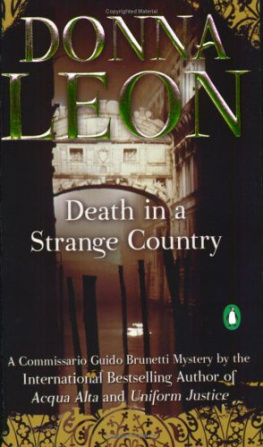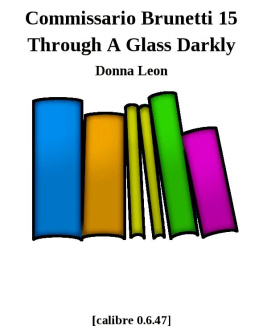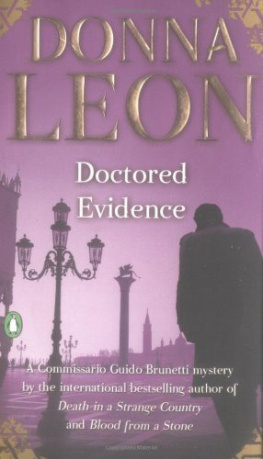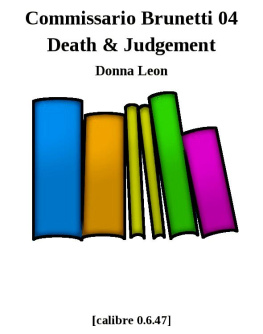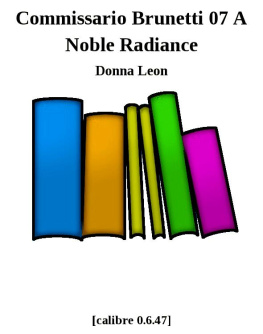Donna Leon - A Question of Belief (Commissario Brunetti 19)
Here you can read online Donna Leon - A Question of Belief (Commissario Brunetti 19) full text of the book (entire story) in english for free. Download pdf and epub, get meaning, cover and reviews about this ebook. year: 2010, publisher: Random House Publishing Group, genre: Detective and thriller. Description of the work, (preface) as well as reviews are available. Best literature library LitArk.com created for fans of good reading and offers a wide selection of genres:
Romance novel
Science fiction
Adventure
Detective
Science
History
Home and family
Prose
Art
Politics
Computer
Non-fiction
Religion
Business
Children
Humor
Choose a favorite category and find really read worthwhile books. Enjoy immersion in the world of imagination, feel the emotions of the characters or learn something new for yourself, make an fascinating discovery.
- Book:A Question of Belief (Commissario Brunetti 19)
- Author:
- Publisher:Random House Publishing Group
- Genre:
- Year:2010
- Rating:4 / 5
- Favourites:Add to favourites
- Your mark:
- 80
- 1
- 2
- 3
- 4
- 5
A Question of Belief (Commissario Brunetti 19): summary, description and annotation
We offer to read an annotation, description, summary or preface (depends on what the author of the book "A Question of Belief (Commissario Brunetti 19)" wrote himself). If you haven't found the necessary information about the book — write in the comments, we will try to find it.
A Question of Belief (Commissario Brunetti 19) — read online for free the complete book (whole text) full work
Below is the text of the book, divided by pages. System saving the place of the last page read, allows you to conveniently read the book "A Question of Belief (Commissario Brunetti 19)" online for free, without having to search again every time where you left off. Put a bookmark, and you can go to the page where you finished reading at any time.
Font size:
Interval:
Bookmark:
This eBook is copyright material and must not be copied, reproduced, transferred, distributed, leased, licensed or publicly performed or used in any way except as specifically permitted in writing by the publishers, as allowed under the terms and conditions under which it was purchased or as strictly permitted by applicable copyright law. Any unauthorised distribution or use of this text may be a direct infringement of the authors and publishers rights and those responsible may be liable in law accordingly.
Version 1.0
Epub ISBN 9781409099673
www.randomhouse.co.uk
On his way back to the Questura, again taking the vaporetto to avoid the sun, Brunetti considered what he and Paola had said to one another and what Paola had not said to the children at lunch. How many times had he heard people use the phrase, Governo Ladro? And how many times had he agreed in silence that the government was a thief? But in the last few years, as though some previous sense of restraint or shame had been overcome, there had been less attempt on the part of their rulers to pretend that they were anything less than what they were. One of his previous superiors, the Minister of Justice, had been accused of collusion with the Mafia, but all it had taken was a change of government for that story to have drifted out of the newspapers and, for all he knew, out of the halls of justice.
Brunetti was, by disposition and then by training, a listener: people sensed that first in him and in his company spoke easily and often entirely without reserve. In the last year, what he heard more and more in the voices of people sometimes a woman standing next to him on the vaporetto or a man in a bar was a mounting sense of disgust at the way they were ruled and at the people who ruled them. It didnt matter if the people who spoke to him had voted for or against the politicians they reviled: theyd be happy to lock them all up in the local church and set it ablaze.
Underlying it all, and this is what troubled Brunetti, was a sense of despair. He was troubled by the helplessness which so many people felt and their failure to understand what had happened, as if aliens had taken over and imposed this system on them. Governments came and governments went, the Left came and then gave place to the Right, and nothing changed. Though politicians often talked of it and promised it, not one of them gave evidence of having any real desire to change this system which worked so very much to their real purposes.
As the boat passed the Piazza, Brunetti saw the crowds, the queues snaking back from the entrance to the Basilica, even at three in the afternoon. What possessed people to stand in the open, under that sun, motionless? It was difficult for him to subtract his familiarity with the Basilica from his store of knowledge. He had been taken there countless times in his youth by his teachers and by his mother: the teachers took their students to show them the beauty, and his mother had taken him, he supposed, to show him the truth and power of her faith. He tried to wipe his mind clear of familiarity with the sweeping glory of the interior and wondered to what lengths he would go if he had but one chance in his lifetime to stand inside Basilica San Marco, and to do so he had to stand in a queue for an hour under the afternoon sun.
He turned to his right to consult the angel on the bell tower of San Giorgio, and together they decided. Id do it, Brunetti said and nodded in affirmation, much to the discomfiture of the two scantily clad girls who sat between him and the window of the boat.
He went directly to Signorina Elettras office, which was, as he expected to find it, even hotter than it had been the day before. Today it was her blouse that was yellow, but she still seemed entirely untouched by the heat.
Ah, Commissario, she said as he came in, Ive found your Signor Gorini.
Speak, Muse, Brunetti said with a smile.
Signor Gorini, who is forty-four, according to the information on his carta didentit, she began, sliding a sheet of paper towards him, was born in Salerno where, from the age of eighteen to twenty-two, he was a seminarian with the Franciscan fathers.
She looked up, pleased. Brunetti smiled in return, equally pleased.
Then, for a period of four years, there is no sign of him, until he reappeared in Aversa, working as a clinical psychologist. She glanced at Brunetti to see that he was following. He nodded encouragingly.
While he was living there, he married and had a son, Luigi, who is now sixteen. She flicked a speck of dust from the page before consulting it again.
After he had been in practice though I think that word is notional in Aversa for five years, he was discovered to have neither a licence nor a degree in psychology, nor, so far as the ULSS authorities could determine at the time, any training in psychology whatsoever.
What happened to him?
His practice was closed and he was fined three million lire. But the fine was never paid because Signor Gorini removed himself from Aversa.
And the wife? And the son?
It would seem neither of them ever heard from him again.
Obviously, he was better suited to the cloistered life, Brunetti permitted himself to say.
Clearly, she agreed and shifted the paper aside to uncover another.
He next came to the attention of the authorities eight years ago, when it was discovered that the centre he was running in Rapallo, which specialized in helping integrate refugees from Eastern Europe into the workforce, was merely a kind of hostel where he allowed immigrants to live while they went out to work at jobs he found for them.
And in exchange?
In exchange, they gave him 60 per cent of their salaries, but they were at least given a place to live.
Meals?
Dont be absurd, Dottore. He was also helping to introduce them to the experience of living in a capitalist society.
Every man for himself, Brunetti said.
Dog eat dog, she replied, then added, Though in this case one hopes that is not true. They could cook in this place where they lived.
At least that, Brunetti said. What happened?
One of the women went to the Carabinieri. She was Romanian, so she could make herself understood. She told them what was going on, and they made a visit to the centre. But Signor Gorini was not to be found.
Did he use his own name all this time? Brunetti asked.
Yes, he did, she said. And apparently that was fine.
Lucky for you that he did use it, he said, then, seeing her response, quickly added, Though Im sure it would have made no difference to you if hed used another one. It just would have taken longer.
Minimally, she said, and Brunetti believed her.
And since then? he asked.
There was no trace of him for a few years, and then five years ago he set up a practice as a homeopathic doctor, this time in Naples, but, and here she looked up and shook her head in open astonishment, after two years someone checked his application file and discovered that he had never studied medicine.
What happened?
The practice was closed. That was all she said. Perhaps it was not a crime in Naples to practise medicine without a licence.
Two years ago, she continued, he changed his residence to the address you gave me, but he is not the person in whose name the rental contract is written.
Who is that?
A woman named Elvira Montini.
Who is?
Who works as a lab technician at the Ospedale Civile.
Maybe hes gone straight, Brunetti suggested.
She raised her eyebrows at this idea but said nothing.
Have you found any indication of what hes doing?
For all I can find, he could be devoting himself to a life of contemplation and good works, she said.
Yet Vianellos aunt seems to be taking large sums of money to him at that address, said a sceptical Brunetti. To one of the people at that address, at any rate, he corrected. Thats the only apartment that uses that entrance.
Next pageFont size:
Interval:
Bookmark:
Similar books «A Question of Belief (Commissario Brunetti 19)»
Look at similar books to A Question of Belief (Commissario Brunetti 19). We have selected literature similar in name and meaning in the hope of providing readers with more options to find new, interesting, not yet read works.
Discussion, reviews of the book A Question of Belief (Commissario Brunetti 19) and just readers' own opinions. Leave your comments, write what you think about the work, its meaning or the main characters. Specify what exactly you liked and what you didn't like, and why you think so.



